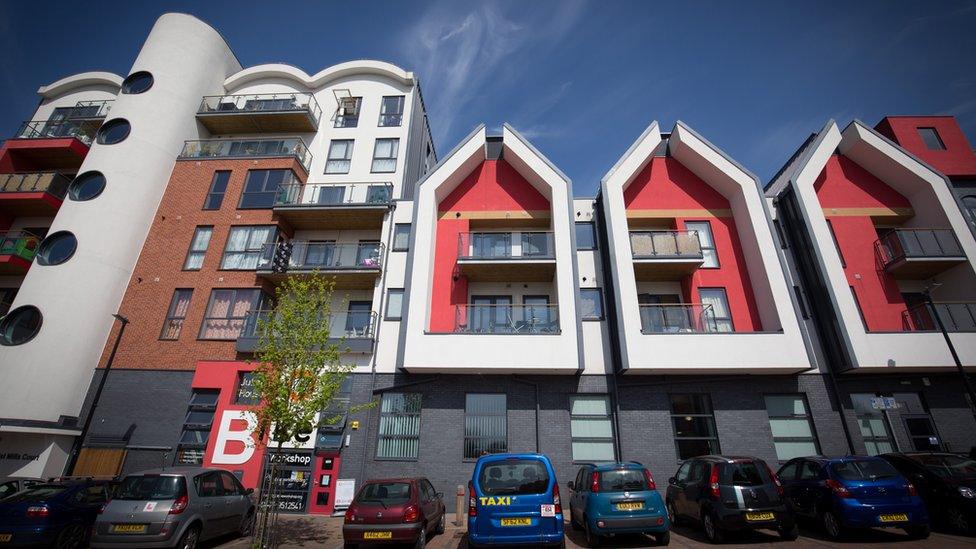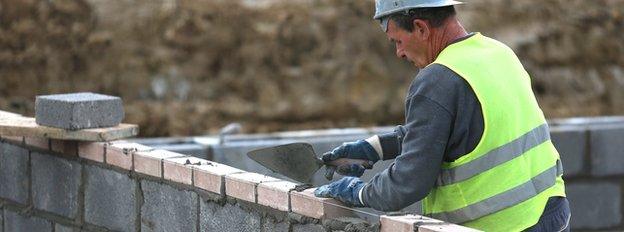Why 'starter homes' are controversial
- Published

At the Conservative Party conference, David Cameron pledged to build more affordable homes across the UK.
Under the "starter homes" programme, originally announced a year ago, 200,000 first-time buyers will be able to purchase new houses or flats at a 20% discount.
The quid pro quo of this arrangement is that developers will be relieved of their obligations to provide affordable homes for rent, or having to pay for general local infrastructure such as roads, or indeed schools.
While this may be good news for Britain's aspiring homeowners, the worry is that there will be fewer homes for poorer families to rent.
And local authorities fear they will have billions of pounds less to spend on infrastructure.

What is the starter homes programme?
When, eventually, the first building bricks are laid, the government's starter homes initiative will offer first-time buyers a much better deal than they currently get on the Help to Buy programme.
Buyers will need to be under 40, and cannot have owned their own home previously.
They will get at least a 20% discount on the purchase price, but they will not be allowed to sell or rent the properties for their full market value for five years.
According to the plans, external published so far, the discounts will apply to properties worth up to £250,000 outside London, or £450,000 in the capital.
Permission will only be granted where land is scheduled as under-used, or as an unviable commercial or industrial site.


Why is the scheme controversial?
Housing associations fear that even fewer affordable homes will now be provided for people to rent. The trend is already going down.
Five years ago, 60,480 affordable homes were built in England.
By 2013-14 that had fallen to 42,920, according to government figures.
Social rents - the cheapest - have declined significantly, while "affordable rents", introduced in 2011, have largely replaced them. They offer rent at 80% of market value.
Intermediate affordable housing - mostly homes in shared ownership schemes - has also declined.
The housing charity Shelter has called the starter homes scheme a "non-starter". It has calculated that outside London, the houses will cost up to nine times the average salary, and 11.5 times the average wage in the capital.
It claims that they will only be affordable to those on average incomes in 58% of local authorities.
"There's nothing wrong with helping people on to the property ladder, but the government has to invest in genuinely affordable homes to buy and rent for all of those on ordinary incomes who are bearing the brunt of this crisis," said Campbell Robb, Shelter's chief executive.
The charity Crisis has called the plans "disastrous".

Will it mean less money for councils?
Local authorities are anxious about the money they will lose under so-called section 106 payments. These are the obligations that developers have to meet to benefit the community, in return for getting planning permission.
They consist of providing a certain percentage of affordable homes in any development, as well as payments for general local infrastructure.
The Local Government Association (LGA) says that typically developers pay about £15,000 per home.
If developers are no longer required to make such payments, cash-strapped local councils will lose a further £3bn, according to LGA estimates.


Will more houses get built as a result?
At the start of the financial crisis, in 2007, some 177,650 homes were completed in England. This plunged to 106,720 three years later. Since then the industry has recovered significantly, building 131,060 in the year to June.
But, as the chart above shows, it is the private sector that is responsible for most house building, and it is the private sector which has suffered most.
As a result, many people feel the relaxations on planning rules are the most effective way to encourage developers to build more.
Banks who lend money to buyers also support the plans.
"The announcement of a new relaxation of strict planning regulations to encourage house builders to develop affordable homes is a positive development for both first-time buyers who are struggling to get on the ladder, as well as to the housing market as a whole," said Charles Haresnape, group managing director of mortgages at Aldermore Bank.


What about affordability then?
But the bigger question remains affordability.
If, by building more houses, prices fall, and more people can afford to buy them, then the government will be able to claim success.
But if prices continue to rise, and it is only the wealthy middle classes who are able to take advantage of an extra leg-up from the government, the starter homes scheme is unlikely to prove popular with those destined to remain renters rather than owners.
And when these homes eventually come back on the market, they will be sold at full price.
They will - in effect - be affordable just once.